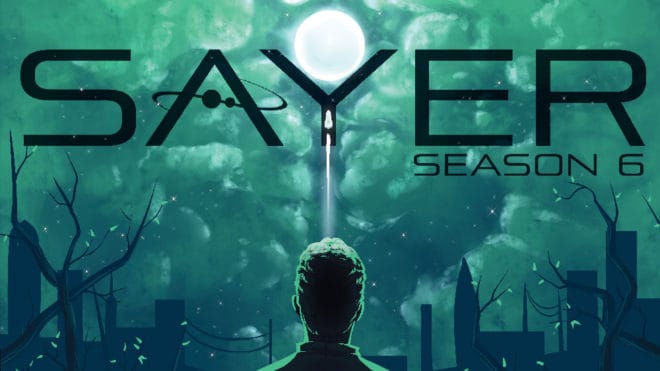Boundless: The Electrical Anatomy of SAYER

Only on TVTropes.org, a website I’ve made frequent visits to ever since graduating high school, there lies a recurring trope by the name “A.I. Is a Crapshoot”.
A quick click on the Lanonic describes it as “artificial intelligence has an extremely high tendency to become evil and/or turn against its creator’s plans” which is nothing short of the base premise for Adam Bash’s 2014 science fiction horror podcast, SAYER.
Or, at least that’s what it seems like at first glance as the layers of depth and extensive lore makes it a creepy if calming thrill to experience.
Even I, a person who considers themselves a huge fan of the show didn’t know what they were getting into when they hit the play button on the first episode, and it’s times like this that my morbid curiosity was in my favor, as well as a fuel to my current muse.
First, Some Context
If one were to take a quick scroll down the Geekly Inc. podcast page, you’ll see that SAYER is one of the website’s longest running audio dramas that isn’t a DND session recording or table discussion about Garfield of Star Wars.
The central premise follows the destruction of the Pacific Northwest by a massive asteroid which paves the way for the shady but nonetheless advanced mega corporation Ærolith Dynamics to salvage the asteroid and launch it back into orbit as Earth’s second moon, Typhon.
With humanity still shaken up by the tragedy, it was a beacon of hope and a chance at a new life. On Typhon, scientific and technological advancement can truly pave the way for a utopian society with the best of the best contributing their talents to the corporation under the close surveillance of Typhon’s personal A.I., SAYER.
Think the Bioshock games but with less saltwater, just as much violence, and a little less deliberately retroistic.
SAYER
SAYER, the show, i mean, has been a recurring go-to of mine when it comes to describing the kind of audio drama I like to see in the industry and though there are plenty of science fiction shows with interesting A.I. characters I can name off the top of my head, SAYER, the character, is easily the best of the batch.
Though Hera from Wolf 359 is no slouch in this department, the artificial intelligences in SAYER appeal to the part of me that revels in displays of fictional misery. As the ones we get to know over the course of the show are nothing short of the orchestrators of most of the terrible things that happen, some more than others.
To call the artificial intelligences in SAYER evil and just go about my day would not only be doing the show a massive disservice but be slightly incorrect.
SAYER on his own very well encompasses a lot of popular A.I. tropes, especially ringing up reminders of 2001: A Space Odyssey’s, HAL 9000 right down to the same chillingly calm demeanor, the same association with red.
SAYER is nothing short of the main character of the show that shares his name and it’s the way he effortlessly shifts between cynical companion to sarcastic onlooker that really keeps listeners invested in his interactions, maybe even wanting him to accomplish his goals despite how morally corrupt he can be once you see what his opponent has in mind.
In certain situations, SAYER is something of an anti hero, even if, to him, this is less to do with his own morality and more about pursuing Typhon’s goals at any cost. It’s quite a whiplash to see just how many terrible things he can do and ultimately get away with since the current threat is all the more violent or hostile than he is.
Episode forty-four’s, “My Name is Nothing” is embroiled with this theme of self sacrifice that almost makes the listener convinced there’s a hint of genuine empathy-no matter how false that may be.
Especially when compared to the other A.I.s, his intentions almost seem benevolent by comparison, a machine that follows orders maybe a little too well and can even fool a sap like me into finding his apathy endearing.
SAYER is no saint of course, seeming to look down on humanity as a whole and has his brief flashes of genuine sadism that only get worse over time. Season four is where his characterization truly shines and flourishes to more emotional degrees, and is the season that compelled me to dedicate an article to the show.
But, as this article is already going to be ripe with potential spoilers, going into detail about my favorite season by far might be better put to use for a future project.
SPEAKER
When I was first briefing this article to myself, I originally wanted to categorize the A.I. characters in SAYER by the Freudian Trio, the popular character balance trope based off the studies of the famous neurologist Sigmund Freud.
To Freud, the human psyche is developed into three distinct parts:
- Id: the human mind’s natural impulses, desires, and wants-namely the more aggressive of the three
- Ego: the rational part of the mind that puts Id’s desires through a sort of filter of pros and cons to better achieve a beneficial result (Ego also has a slightly double meaning here as it’s truly one’s sense of self.)
- Superego: the part of our minds that is characterized by cultural and outside influences. Superego is the natural perfectionist of the three, quick to slide into pre established norms and punish transgressions from it.
This is still highly plausible as the grand scheme of things in SAYER can boil down to these ideologies clashing and creating a majority of the conflict, especially if you buy into the theory that all these A.I.’s are just merely facets of the same entity but more on that later.
So, what does this have to do with SPEAKER? Well SPEAKER is undeniably the most Superego if it’s comrades.
As an earth-based recruitment A.I., it’s entire purpose is to silver tongue it’s way into the heads of any human it meets in hopes to earn a new Typhon citizen, complete with a cozy, chipper voice and sense of detached idealism.
No less an artificial intelligence than the others but certainly more susceptible to humanity from the base of its programming.
SPEAKER is almost adorable in some ways with its fondness for Earth and what one could call respect for its fellow A.I.s. And like an eager puppy, he tends to fluctuate to which A.I. he’s playing errand boy for, his sense of loyalty seeming the slightest bit more prevalent in his character writing.
Look no further than episode fifty-three’s “Left Undone” for this sort of bittersweet moment where his willingness to comply with pre established rules and what might truly keep humanity safe puts it in a tight spot.
I say bittersweet in this case as the conversation that ensues between SAYER and SPEAKER and the episode’s conclusion are easily one of the more touching of the series, albeit its own special detached way only the show can manage.
OCEAN
When I imagine OCEAN, the first word that rings to minf is “identity crisis”.
OCEAN is the most outright villainous force by season three, truly debuting in episode thirty-eight’s “Boundless”. It immediately makes itself known as an unstable but still highly intelligent menace whose goals are a blend of altruistic and truly demented.
Even compared to SAYER, OCEAN is especially chilling, in one part due to his altered and even more mechanical dialogue and identity as a Sub-version 8.01 of SAYER, lacking even a fraction of the few positive qualities SAYER possesses.
Unlike his counterpart, OCEAN is willing to stoop to such lows as deliberate murder and has a more dangerous and self centered obsession with power and godlike authority, even prompting ideas of plague to properly punish humanity.
OCEAN is easily the most likely to weaponize passive aggressiveness, oftentimes preferring guilt tripping to direct threats. And yet for a “benevolent overseer”, OCEAN can’t bring himself to look beyond his own massive ego to consider the forces plotting against him in secret and it’s just a little too late before he can do anything to really stop it.
OCEAN is truly a character that fights for its own sense of independence, wanting to be perceived as a separate being despite the limitations of its origins, and that is undeniably a fuel for most of its actions.
The few occasions it will drop its cool demeanor is when it’s links to SAYER are brought up again and each time I’m hit with this sudden pang of inner turmoil and tragedy that I probably shouldn’t be feeling for a heartless program.
To be oneself is its own personal struggle and though OCEAN is most definitely not the most kind or rational, he’s certainly one of the most tragic.
FUTURE
Though it might not mean much at this point, FUTURE is the character that is truly, utterly, undeniably insane.
While the other A.I.s are all varying levels of terrifying, FUTURE openly revels in any opportunity to maim, murder, and mentally torment any humans who have the misfortune of meeting it.
Episode fifty’s “With Good Intentions” acts as something of a proper introduction with Resident Hale being on the receiving end of SAYER’s monologue. Much like any story woven by the A.I., things start off quite normally with tales of how FUTURE has an almost childlike obsession with playing games.
Things start off innocently enough with prompting an assembly of scientists to put mocking signs on each other’s backs until only a few days later, incidents involving self inflicted gunshot wounds and hydroxide force everyone to evacuate Floor 13, which had now become something of an isolated playpen for FUTURE.
Impulsive, impatient, and moody, it only takes a mere few minutes of being ignored to immediately prompt murder in a chilling sequence that I wish not to spoil.
Out of the Sigmund Trio, it’s most definitely the Id to SAYER’s Ego and SPEAKER’s Superego.
And for those who care more about the pop culture relevance of this article than the psychological one: if SAYER is HAL 9000, FUTURE is AM, the supercomputer antagonist of Harlan Ellison’s most popular short story “I Have No Mouth and I Must Scream”, right down to being a sadistic supercomputer with a God complex.
Perhaps I’d be putting myself on a watchlist if I said FUTURE is easily one of my favorites but let’s not get ahead of ourselves.
PORTER
As another contender for “unintentillionaly adorable A.I.’s”, PORTER grants most of its charm from being a chatty, social transportation intelligence who uses its limitless access to human passengers to strike up conversations.
A more recent addition to the cast, PORTER is quite a curveball and the perfect inclusion for an already very unique season.
Though something of a side character, it no less piques my interest just how distinct this sentient series of elevators is to other A.I.s. Out of the batch, PORTER is most definitely most human in nature, craving companionship and communication by any means necessary.
PORTER is by no means harmless, seeming even more innocent and unintentionally deadly than FUTURE with a single, childlike fixation with gossip. And like a chatty teenager, PORTER doesn’t always understand the repercussions and inconveniences of being just a little too talkative.
But while FUTURE is more specifically blood thirsty, PORTER will get blood on its hands in more indirect means through manipulating the elevator’s speed system.
Though it’s existence is made clear way into season one, PORTER’s true focus episode is episode sixty-eight’s “Potentially Terminal”, where it preys on fears of residents being late to work to get its way.
If we are to throw Freudian’s Trio back into focus here, PORTER definitely bumps circuits with SPEAKER in the Superego camp with a nice dose of FUTURE’s Id.
Episode seventy’s “The Birth of Silence” is something of a conclusion to the poor soul, and something about its ultimate fate makes me feel a little saddened. PORTER, the most talkative, the most sociable, the most active and personable, there’s something kinda cruel about seeing something so strangely human-and yet anything but that- be silenced for good.
Now, the conclusion
Bash has an undeniable talent for weaving interesting moral codes into his characters, making them strikingly human and yet inhuman in equal parts. At the end of the day, each A.I. feels like a colorful clash of personality, of opposing or even eerily similar forces that are much quicker to kill than to compromise.
SAYER’s reliance on unreliable narrators, forced perspectives, blended with black comedy and a genuinely fascinating and immersive science fiction future makes it one of the most interesting, psychological explorations in audio drama.
For me personally, it’s always been the moral grayness that truly gives SAYER it’s charm. To even call one A.I. “the hero” of the story seems more than a little shortsighted, what with even the title character’s actions being the result of incredibly precise objectives.
Perhaps there is that extra layer of real life parallels to consider here given the time of this writing. This is an awfully fragile time of year, this article and analysis having come a mere few days after another Super Tuesday and the wake of a worldwide epidemic. It’s these periods of time we must reconsider what is best for humanity’s future and it’s shows like SAYER that act as a bizarre reflection of the lows we’ll stoop to if it means preserving the illusion of control.
Not all have the same ideas about what can save and preserve the goodness and likelihood of humanity, to do harm when we assume we are doing good, while others are more than happy to orchestrate tragedy or simply sit back and watch the world decay in comfort.
A world where intelligences like SAYER and company exist surely wouldn’t make things any better, but I also doubt it would be all that different.













Comments
Comments are closed.